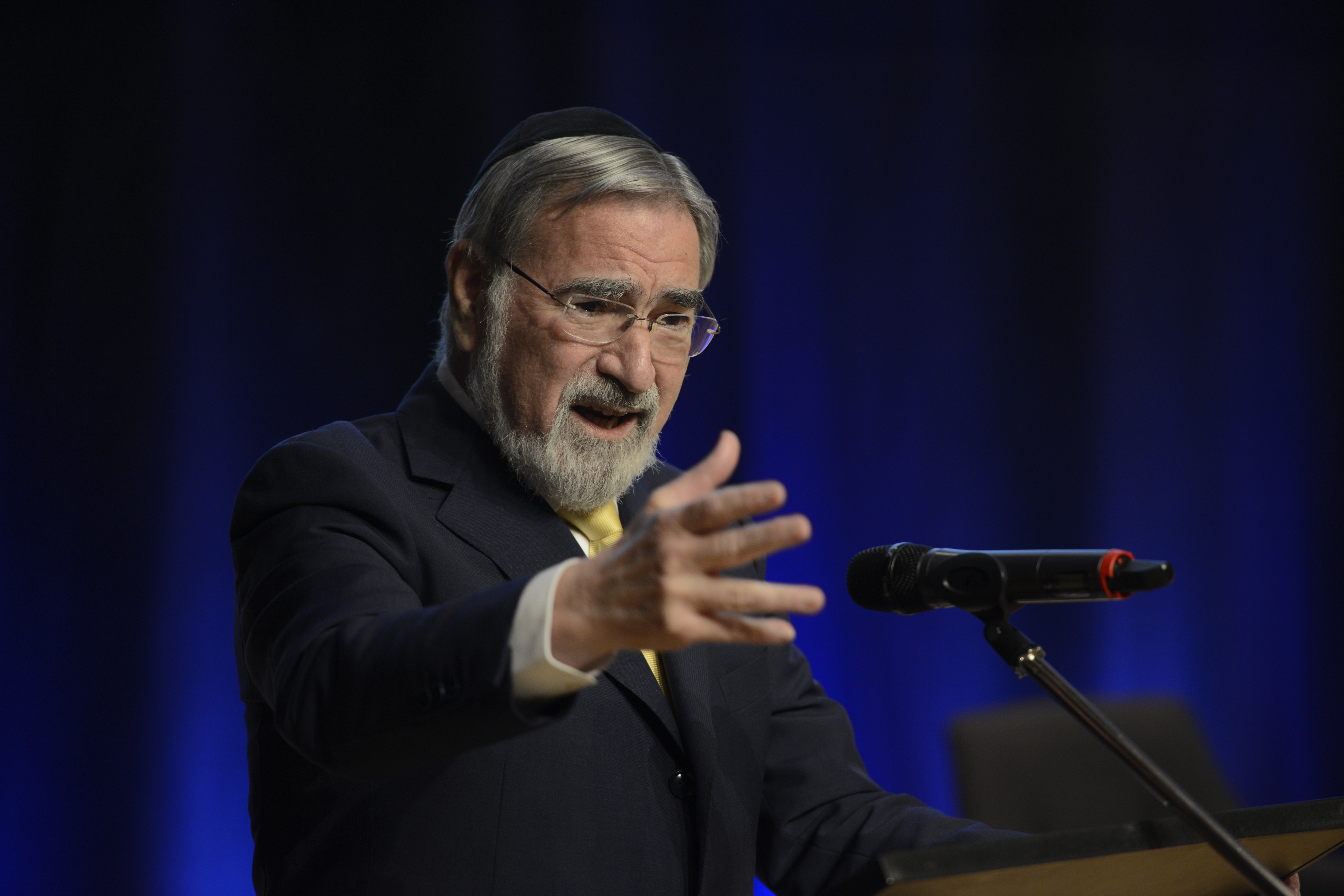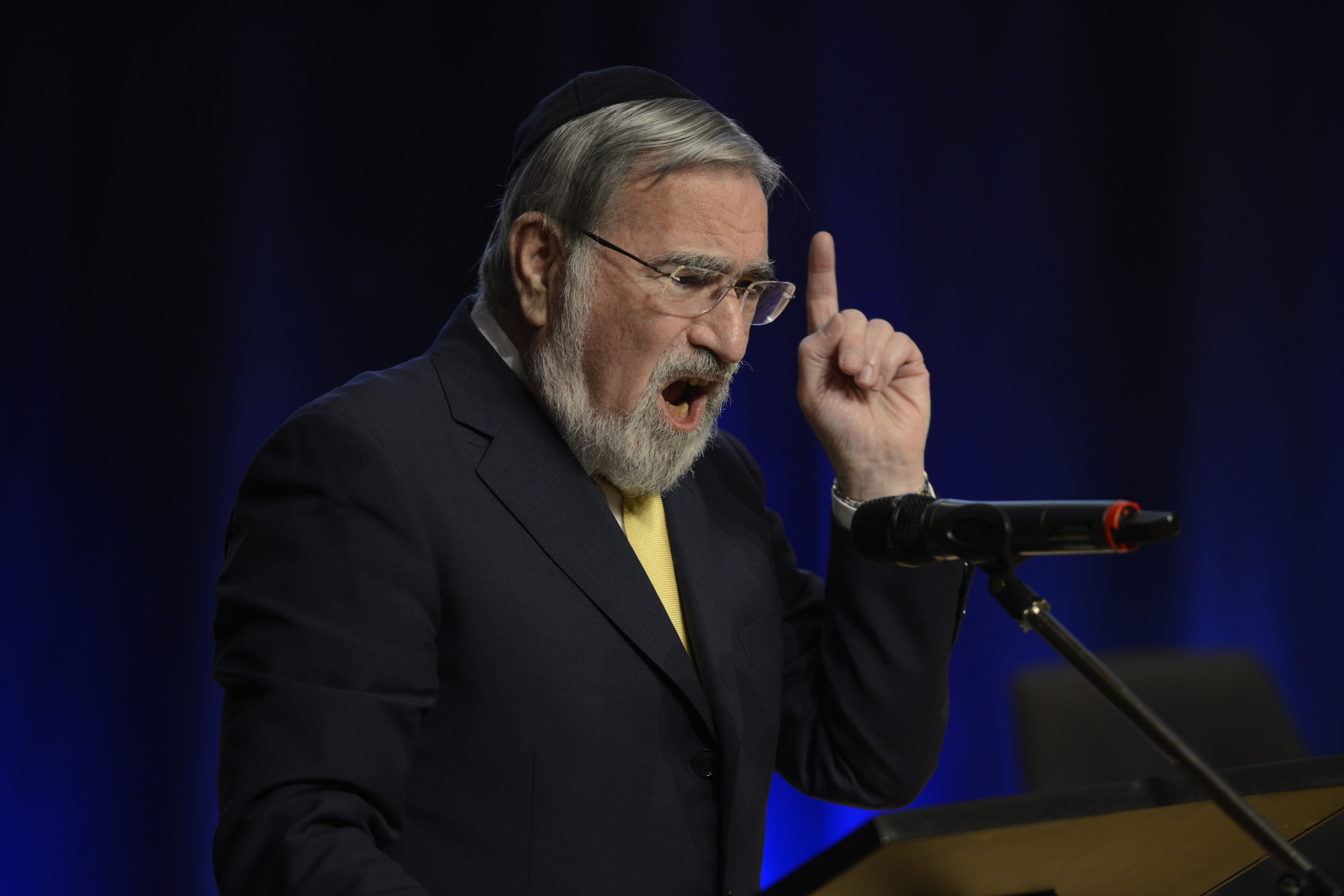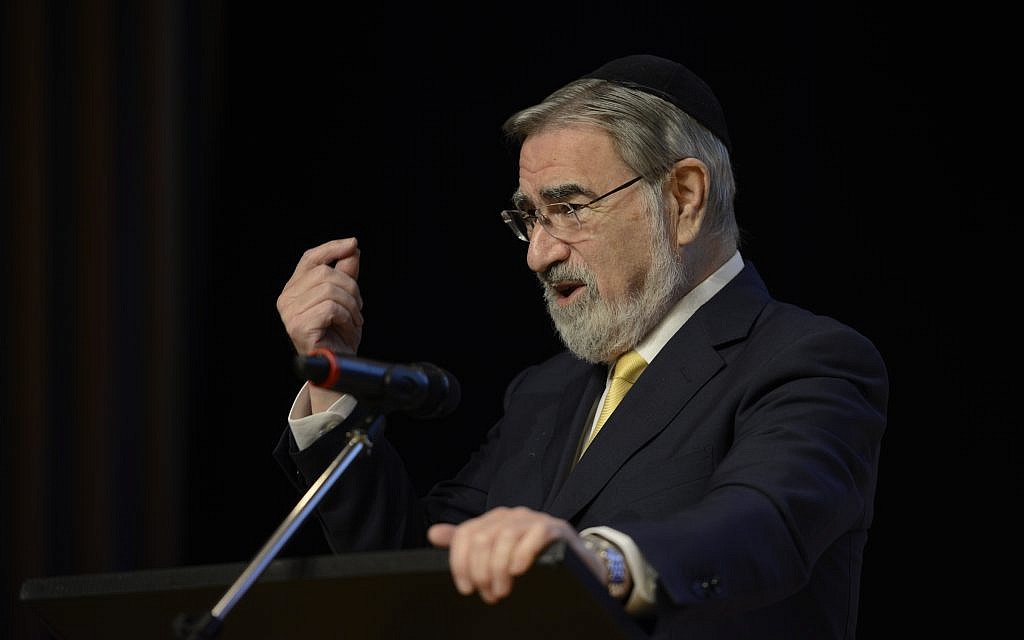Lord Sacks: ‘society has lost the concept of public service’
Former Chief Rabbi calls for 'a new Abraham Lincoln to step forward' while speaking at JW3 event under the banner of 'exploring belief
The former chief rabbi, Lord Sacks, has deplored the absence of leadership in public life and called for “a new Abraham Lincoln to step forward”.
Lord Sacks was the launch speaker for an all-day event at JW3 under the banner of “Exploring Belief”, the second religion and media festival.
In a wide-ranging address, and then in conversation with the ITV broadcaster Julie Etchingham, Lord Sacks said that society today “has lost the concept of public service”. Once, he said, people believed it was their “moral duty” to work for the public good, but he hoped that “someone like that would emerge once again”.
Get The Jewish News Daily Edition by email and never miss our top stories Free Sign Up
Lord Sacks identified two key moments in which he felt society had changed — the withdrawal of Soviet troops from Afghanistan, and the fatwa imposed against the author Salman Rushdie, both of which had taken place in 1989. People had failed to see their significance at the time, he said, “because they were not reading the religious map, they failed to hear the religious music”.
Both such events, he said, showed people that “religion was a global phenomenon, while governments were only national phenomena”.
With “the shining exception of the BBC”, Lord Sacks said, he did not feel that the media “covers religion as well as it might; and he agreed with a member of the audience who suggested that there were many “good news” religious stories which did not receive enough publicity.

To general laughter, the former chief rabbi recalled a meeting he had had in Jerusalem two years ago which amply illustrated his belief that religion had something to say in almost every public sphere. It was a meeting requested, he said, by members of the strictly Orthodox Eda Haredit movement.
At first, Lord Sacks did not understand what they wanted to discuss. But they told him that they had been hired by a hi-tech company to help devise an ethics code for self-driving vehicles.
“They loved it”, Lord Sacks declared, “they loved the idea that there was a possible solution in the Torah for such a modern-day problem”.
The rabbis had been asked to visualise a situation where a self-driving car was going to skid on ice and hit one of two cyclists, one with a helmet, one without. Such discussions were meat and drink to the Eda Haredit, he suggested.
Lord Sacks, though generally upbeat and hopeful that religious literacy could improve in the media, nevertheless was unhappy about what he called “public shaming” in social media. “We have moved into a form of vigilante justice”, he said, “once you have been nailed you have no chance to state your case. It is the return of the mob”.
A wonderful start to #ExploringBelief Religion in the Media Festival 2019 with Lord @rabbisacks and @julieetchitv discussing the way religion has shaped our modern landscape pic.twitter.com/ivpdVB249O
— JW3 (@JW3London) April 30, 2019
In the wake of the most recent attacks on places of worship in Pittsburgh, New Zealand, Sri Lanka and San Diego, the former chief rabbi said that high levels of security at religious centres, not just Jewish ones, “would become the norm, since it has become apparent that people are not prepared to hold back from desecration”.
In all those places, he said, terrorists had attacked “soft targets” and it was incumbent on everyone not to present such targets and to question risks.

The all-day event, jointly hosted by the Religion Media Centre and JW3, was attended by religious representatives and humanists. James Purnell, the BBC’s director of radio and education, who is responsible for religious programming, was one of the highlight speakers, while one of the best attended panels was that on reporting religion, with broadcast presenters from the BBC and CNN.
A special media prize was announced, launched by the Understanding Unbelief programme, to honour the work of journalists and programme makers in exploring the nature and diversity of unbelief, including atheism, agnosticism and related phenomena, throughout the world.

Thank you for helping to make Jewish News the leading source of news and opinion for the UK Jewish community. Today we're asking for your invaluable help to continue putting our community first in everything we do.
For as little as £5 a month you can help sustain the vital work we do in celebrating and standing up for Jewish life in Britain.
Jewish News holds our community together and keeps us connected. Like a synagogue, it’s where people turn to feel part of something bigger. It also proudly shows the rest of Britain the vibrancy and rich culture of modern Jewish life.
You can make a quick and easy one-off or monthly contribution of £5, £10, £20 or any other sum you’re comfortable with.
100% of your donation will help us continue celebrating our community, in all its dynamic diversity...
Engaging
Being a community platform means so much more than producing a newspaper and website. One of our proudest roles is media partnering with our invaluable charities to amplify the outstanding work they do to help us all.
Celebrating
There’s no shortage of oys in the world but Jewish News takes every opportunity to celebrate the joys too, through projects like Night of Heroes, 40 Under 40 and other compelling countdowns that make the community kvell with pride.
Pioneering
In the first collaboration between media outlets from different faiths, Jewish News worked with British Muslim TV and Church Times to produce a list of young activists leading the way on interfaith understanding.
Campaigning
Royal Mail issued a stamp honouring Holocaust hero Sir Nicholas Winton after a Jewish News campaign attracted more than 100,000 backers. Jewish Newsalso produces special editions of the paper highlighting pressing issues including mental health and Holocaust remembrance.
Easy access
In an age when news is readily accessible, Jewish News provides high-quality content free online and offline, removing any financial barriers to connecting people.
Voice of our community to wider society
The Jewish News team regularly appears on TV, radio and on the pages of the national press to comment on stories about the Jewish community. Easy access to the paper on the streets of London also means Jewish News provides an invaluable window into the community for the country at large.
We hope you agree all this is worth preserving.
-
By Brigit Grant
-
By Laurent Vaughan - Senior Associate (Bishop & Sewell Solicitors)
-
By Laurent Vaughan - Senior Associate (Bishop & Sewell Solicitors)
-
By Laurent Vaughan - Senior Associate (Bishop & Sewell Solicitors)
-
By Laurent Vaughan - Senior Associate (Bishop & Sewell Solicitors)






















